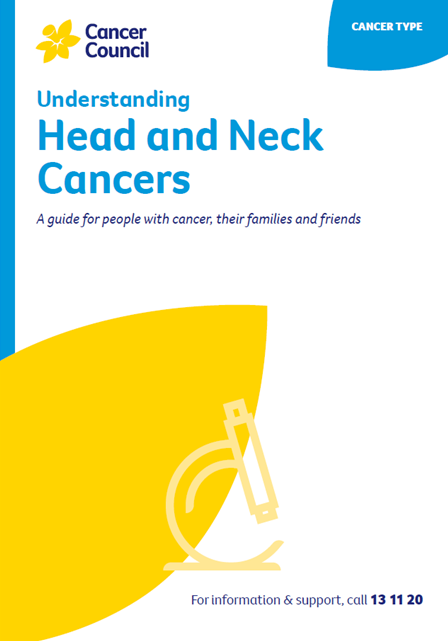- Home
- Head and neck cancers
- Managing side effects
- Swallowing difficulties
Swallowing difficulties
Your lips, teeth, tongue and the muscles in your mouth, jaw and throat all work together to help you chew and swallow. Difficulty swallowing (dysphagia) before, during or after treatment is common. This may be because of the cancer or the treatments, and may be short or long term.
Learn more about:
- Overview
- Treatments that may affect swallowing
- Swallowing test
- How to eat when swallowing is difficult
- Using a feeding tube
- Types of feeding tubes
Overview
Swallowing is important to make sure you eat and drink enough. Signs of swallowing difficulties include: taking longer to chew and swallow; taking longer to eat a meal than your family and friends; coughing or choking while eating or drinking; food sticking in your mouth or throat; or pain when swallowing.
Treatments that may affect swallowing
| Surgery to the jaw, mouth or throat areas | This may make chewing and swallowing difficult because tissue has been removed or reconstructed, or because the surgery has caused dry mouth. |
| Surgery to the larynx or pharynx | This may make swallowing difficult and cause food to go down the wrong way and into the lungs (aspiration). (This is unlikely after a laryngectomy.) Signs of aspiration include: coughing during or after swallowing; increased shortness of breath during or after a meal; and recurrent chest infections. A speech pathologist can check how your swallowing is working (see Swallowing test) and give you strategies to help you eat and drink safely. |
| Radiation therapy | This can cause dry mouth, pain, and weaken the muscles and nerves used to swallow. It may be worse if you have chemoradiation (chemotherapy and radiation therapy at the same time). |
Swallowing test
You may have a test before and after treatment to look at what happens when you swallow. A speech pathologist uses a movie-type x-ray known as a videofluoroscopic swallow study or modified barium swallow study to check that foods and liquids are going down the correct way. You may also have a test called a fibre-optic endoscopic evaluation of swallowing during a nasendoscopy to see how well you can swallow. The test results will help the treatment team plan how any swallowing issues are treated.
How to eat when swallowing is difficult
- See a speech pathologist or ways to chew and swallow to help reduce discomfort or food going down the wrong way (aspiration). They can show you swallowing and vocal exercises and ways to change your posture that may help. To find a speech pathologist, ask the team at your treatment centre or visit Speech Pathology Australia.
- Continue to eat and drink when possible throughout treatment to keep your swallowing muscles working and reduce the likelihood of long-term problems. Even if you have a feeding tube, eating and drinking small amounts can help with swallow recovery, as long as there is no risk of aspiration.
- Ask your doctor about medicines to relieve any discomfort. Medicines may include mouth rinses.
- A speech pathologist can suggest ways to adjust the consistency of food to make it easier to swallow.
- If it is hard to swallow fluids without choking, a speech pathologist can advise ways to thicken supplement drinks. Thicker fluids are easier to control in your mouth so there is less chance of them going down the wrong way.
- See a dietitian to make sure you are getting enough nutrition and hydration.
- Try the recipes in 2 free online books from Griffith University – From Treatment to Table and Beyond the Blender: Dysphagia Made Easy.
→ READ MORE: Using a feeding tube
Podcast for people affected by cancer
Listen now
More resources
A/Prof Martin Batstone, Oral and Maxillofacial Surgeon and Director of the Maxillofacial Unit, Royal Brisbane and Women’s Hospital, QLD; Polly Baldwin, 13 11 20 Consultant, Cancer Council SA; Martin Boyle, Consumer; Dr Teresa Brown, Assistant Director Dietetics, Royal Brisbane and Women’s Hospital, Honorary Associate Professor, University of Queensland, QLD; Dr Hayley Dixon, Head, Clinical Support Dentistry Department, WSLHD Oral Health Services, Public Health Dentistry Specialist, NSW; Head and Neck Cancer Care Nursing Team, Royal Melbourne Hospital, VIC; Rhys Hughes, Senior Speech Pathologist, Peter MacCallum Cancer Centre, VIC; Dr Annette Lim, Medical Oncologist and Clinician Researcher – Head and Neck and Non-melanoma Skin Cancer, Peter MacCallum Cancer Centre, VIC; Dr Sweet Ping Ng, Radiation Oncologist, Austin Health, VIC; Deb Pickersgill, Senior Clinical Exercise Physiologist, Queensland Sports Medicine Centre, QLD; John Spurr, Consumer; Kate Woodhead, Physiotherapist, St Vincent’s Health, Melbourne, VIC; A/Prof Sue-Ching Yeoh, Oral Medicine Specialist, University of Sydney, Sydney Oral Medicine, Royal Prince Alfred Hospital, Chris O’Brien Lifehouse, NSW.
View the Cancer Council NSW editorial policy.
View all publications or call 13 11 20 for free printed copies.

